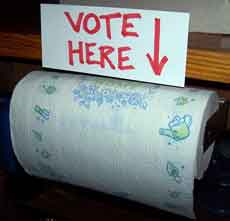By Harry Targ
Professor, Purdue University
I confess. I have been a supporter of the presidential candidacy of John Edwards (particularly since Dennis Kucinich was made to disappear). I think his clear populist stance, his anti-corporate agenda, and his critique of the centrist Democratic Leadership Council represent an advance over the ambiguous and limited centrist politics of Hillary Clinton and Barak Obama and the way John McCain will reframe himself if he is the Republican Party nominee.
A cursory examination of media framing of national political life over the last thirty years would suggest that populist candidates, who verbalize even modest condemnations of corporate power, face public marginalization. It happened to Howard Dean and Dennis Kucinich and it is happening to John Edwards. Corporate media vigorously oppose any political forces at home or abroad who are anti-corporate and who embrace a grassroots approach to policymaking. “The people” are not and cannot be seen as capable of shaping their own political destinies. In the end, it is the corporate elite who must rule.
Having admitted my political “biases,” I have some thoughts about the potential political significance of the Democratic Party primary election in South Carolina. First, the campaign tactics of candidate Clinton and particularly former President Clinton should finally put to rest the popular view that they are crusaders against racism in American life. President Clinton did everything he could to remind voters that Barak Obama was after all an African American and that this election was occurring in South Carolina. In a totally irrelevant response to a reporter’s question after the results were announced President Clinton reminded the reporter and the audience that Jesse Jackson carried South Carolina in the 1980s; i.e. the outcome on Saturday will not count and it will not count because Obama, like Jackson, is an African American.


